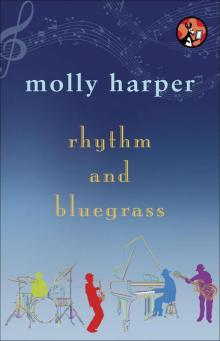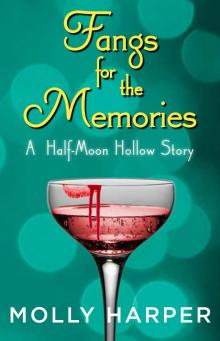- Home
- Molly Harper
Better Homes and Hauntings Page 17
Better Homes and Hauntings Read online
Page 17
But at least she’d found a lovely hat.
“This is called EVP, electronic voice phenomena,” Dotty said, waving the recorder. “Some people think that if you set out a recorder and ask a spirit questions, the recorder will pick up noises and answers from the spirits that the naked ear couldn’t hear.”
“What if you record something you don’t want to hear?” Cindy asked.
“Still safer than a Ouija board,” Dotty said. “Those things are like a giant, evil neon sign that says, ‘Hey, undefined manifestations who mean us harm, here we are!’ ”
Nina laughed. “But don’t people use EVP and electromagnetic meters and all that to confirm the presence of ghosts? I don’t think we have to prove that they’re here. We know they are. I think we need to know why and how to get rid of them.”
“I don’t want to communicate with the spirits,” Dotty assured her. “But wouldn’t it be nice if Catherine or Jack gave us some clue to where we should look for her jewelry or what we could do to undo the curse?”
“Or tell us that Paul is dead?” Nina suggested brightly.
“I think I liked you better when you were all meek and unassuming.” Dotty grunted, lobbing a ball of tissue paper at her.
Nina easily ducked the ineffective projectile and turned her attention back to the diaries. “Here’s another one,” she said, reading aloud.
Jack kissed me today. Just writing those words is terrifying and makes me want to dash them with my pen. If Gerald were to ever find out . . . I shudder, diary, to think what his reaction would be.
It happened so quickly, and I was so shocked that I don’t think I responded appropriately. We were standing at his draft table reviewing plans for my bedroom suite. He was asking me questions about the placement of the bed that I realize now could be construed as intimate. I felt his hand on the back of my neck, and before I knew it, he had turned me around, pressed me back against the table.
I pushed him away, but I am ashamed to say that I felt some stirring inside of me, the longing and giddy lightness of that young girl who once kissed Jack Donovan on her porch swing. All these years, I believed I would never be the sort of woman who welcomed attentions from men other than her husband. But Gerald is gone so often, and Jack is always here. Always.
I am so confused, as unsettled as the storm-tossed waves that eat away at the shores of our new home. Is my marriage so easily eroded? Could I break my bond with Gerald so easily? What sort of woman am I becoming?
Dotty’s face became more unsettled with every word. Nina immediately regretted reading that particular passage. Sometimes she forgot that they weren’t just speculating about characters from some long-forgotten story but that these were Dotty and Deacon’s relatives. And of course, Dotty didn’t want to hear in-depth detail about her great-great-grandmother’s slide into an adulterous affair.
Catherine Whitney had been a lonely woman, isolated with an old flame while undertaking an intimidating task. Of course, she turned to that old flame for comfort. Nina didn’t judge her for it, but she wouldn’t treat the romance as if it was the greatest love story ever told—especially when Dotty or Deacon was around.
“So are we looking for anything in particular, or are we just sifting through the rubble like prospectors?” Nina asked, snapping the diary shut.
“Well, I was sifting, but while we’re up here, I was hoping to find Catherine’s wedding trunk. When she and Gerald got home from their extensive honeymoon, she used it to save her wedding dress and sentimental keepsakes. My grandmother told me about it when I was a kid.”
“How did your relatives not find and pawn this?” Cindy asked.
Dotty began counting the wall panels, until she found the fourth from the door. “Well, I’ll be honest, as much as she loved her husband, my grandmother saw the direction the family was taking in my grandfather’s generation. She didn’t know what was in the wedding trunk, but she knew that it would be a shame to let it be pawned for cash that wouldn’t sustain her spendthrift husband for more than a few months. So she took it.” Dotty shoved a stack of cartons marked “Pots and Pans” away from the wall with a grunt. Hidden behind the stack, she found an old steamer trunk bearing customs stamps from Paris, Berlin, London, and Lisbon. “And she hid it behind a bunch of cartons no one would look at twice. Who wants to sort through old pots and pans when you’re looking for treasures? And one rainy afternoon, right before she died, she told me where she’d hidden it. She made me promise I wouldn’t tell my father or my uncle—whom she loved but didn’t trust with anything valuable—but I had to swear that I’d share what I found with Deacon.”
Nina helped her drag the trunk into an open space in the middle of the room. Dotty plucked a bobby pin from Cindy’s hair with an apologetic shrug. She picked the trunk lock and popped the lid open, filling the attic with the scent of long-dried violets. Nina squealed in delight as they gently lifted a layer of yellowed tissue paper from the top tray, revealing a travel set of monogrammed silver brushes, combs, and a hand mirror. A tiny canister of violet-scented talc with powder puff, an ancient porcelain pot of lip rouge, and a set of pearl-studded hairpins completed the toiletry set. Dotty carefully lifted the tray from the trunk, revealing a carefully folded white satin bundle wrapped in more tissue paper. Nina helped her lift the heavy material from the trunk, unfolding it until it became a long, elegantly cut wedding gown with a high waist, lace sleeves pointed at the wrists, and a long, bell-shaped train.
“Wow,” Cindy marveled. “They sure knew how to make a dress back then. You know, this was a Charles Worth design? He was the Tom Ford of his generation. You really had to rank in the four hundred to get an appointment with him.”
“Gerald would have spared no expense for his bride.” Dotty noticed that the liner of the trunk top didn’t fit quite flush with the edges. She raised a hand to Cindy’s head to search for another hairpin, but the blonde warned her, “If you rip more hair out of my head, you and I are going to have a problem.”
Dotty harrumphed and plucked a pin from the picture hat, then jammed it into the space between the lid and the liner. After a few wiggles, the lid popped loose, revealing a false top that provided a handy—if narrow—secret storage space. A bundle of papers fell into Dotty’s hands.
“Jackpot, ladies!” she crowed, waving the packet over her head. The bundle of letters was tied with a bit of faded pinkish lace. She carefully untied the knotted lace and studied the dates scribbled on the back of the envelopes. “Letters to Catherine spanning, oh, three or four years!”
“Love letters?” Cindy asked.
Nina told her, “Well, I don’t think you tie letters from your school friends up in pink lace and hide them in your wedding trunk. Nobody in this house trusted anybody.”
“Good point. What do they say?”
Dotty very gingerly opened a random letter from the pile.
“ ‘Dearest Kitten,’ ” Dotty read. “ ‘The vision of me holding you in my arms—freely, without watchful eyes and interference—is the only thing that keeps me sane each day. When can we be together? I thought myself a good man, a patient man, a man of morals. But loving you has put every one of those misconceptions to the test. I need you, to touch you, to taste you. When can we give up all of this pretense? When will you be mine?’ ”
“Wow, that’s pretty hot stuff for the time,” Nina said. “Is it signed?”
Cindy let loose a silvery laugh. “No, the author signed it with a little sketch. It’s a little bird. An ugly bird. The letter writer is a better wordsmith than an artist.”
“It’s a crane,” Dotty said, her voice even more deflated than before. “Well, that’s one way to keep from getting caught. It does seem fitting that Jack would use the crane as a symbol, considering the location. After all, the house brought them back together.”
“Is it at all possible it’s from her husband?” Nina asked, more for Dotty’s benefit than for her own curiosity. Dotty seemed honestly disturbed by each new r
evelation about her ancestor.
“It doesn’t sound like something Gerald would write,” Dotty said, her tone skeptical. “I’ve read his business correspondence. Poetic lover he was not. The handwriting is similar, but everyone had lovely penmanship back then.”
“You OK, Dot?” Cindy asked, nudging her arm.
Dotty’s hat drooped as she nodded. “The more I learn about Catherine, the more it seems to make sense and then conflict. It just seems strange that a woman who would have a special passage built so she could go to her children instead of turning them over to nannies at night, who would give so much consideration to her servants’ comfort, would cheat on her husband.”
“Cheating on a spouse, particularly when that spouse is absent and—from what we’ve read—distant and cold, doesn’t make you a bad person,” Cindy told her. “It doesn’t make you a great person, but I don’t think you should think less of her because she was unhappy.”
“I know,” Dotty said. “Maybe I would feel better if we found something written from Gerald’s perspective, something that showed him for a callous, unfeeling jerk who deserved to be cuckolded. Or maybe something from Jack that proved he was worthy of Catherine’s love. Right now, everything feels off-balance.”
“Have you thought about contacting Jack’s family?” Nina asked.
Dotty shook her head, unleashing a small storm of dust from her picture hat. “There is no surviving family. He didn’t have any children. Like I said, he pretty much disappeared from public life after Catherine’s death. Some people claimed to have seen him in the days after her body was found. Even with the scandal, you’d think that he’d be able to parlay building one of the most luxurious homes in the country into more work, but he never did another high-profile project. Some doyenne in Virginia claimed to have hired him to build a summer home on the coast the following year and demanded repayment when he didn’t complete the design. But that didn’t work out, because she couldn’t find him. It’s like he just disappeared from the face of the earth.”
“You can hardly blame him. The woman he loved died suddenly. And there was probably a bit of guilt, since her husband killed her over their affair. He may not have wanted to work again just because of the associations with Catherine.”
“Do any of the letters say anything helpful?” Cindy asked, eager to break the somber mood. “Like, ‘Gerald told me to meet him at the top of the stairs at nine P.M. so he can strangle me?”
“Now, that would be too easy,” Dotty huffed, carefully slipping the letter back into its aging yellow envelope. “Everything here—the letters, the diaries, the artifacts—they’re pieces of the puzzle. I just have to find a way to make them fit.”
“In the meantime, you do look rather fabulous in that satellite-sized hat,” Cindy told her.
Dotty preened, putting on a brave, bright face. “Of course, I do, darling. I’m a Whitney.”
Dotty of the Dead
NINA WAS LOOKING forward to her day, planting an array of annuals timed for different seasons, so that the beds would display different patterns and designs throughout the year. She loved the sturdy elegance of tulips and Johnny-jump-ups mixed with daffodils, which would give way to fiery splashes of snapdragons and poppies.
Ghostly issues aside, Nina was pretty content. She’d deposited Deacon’s latest check, which allowed her to pay off the last of her remaining Rick debts. This made her bank account solvent for the first time in months. She immediately paid several outstanding personal bills online, paid off her credit cards, and rewarded the patience of the lovely folks at the garden center, who had floated her supplies for the last year.
She had no bills due from that very moment until the next payment from Deacon’s office. She even had a little money to spare. She could buy herself something she wanted instead of the bare necessities. She could buy shoes . . . assuming that she managed to get off the island to a shoe store. She would never be able to thank Deacon enough for the difference he’d made in her life. If she had any success as a business owner, it would be as a result of his generosity. She felt a little weird, accepting money from someone she’d committed greenhouse frottage with, but she also knew that wasn’t why Deacon had hired her. She knew she’d earned her place here. He wanted her on the job because she’d been clever and creative in her approach. She belonged here. Making out on the greenhouse floor was just a delightful side benefit.
On the slightly less normal side, she’d spent the previous evening updating her “ghost journal,” something Dotty now insisted that they do at the end of every day. Even if the journal entry was “Nothing to report,” Dotty wanted it documented. She knew Cindy occasionally made up entries, such as “Visited by the ghost of Elvis—may or may not be bearing his love child,” but Nina tried to be as honest as possible. After all, poor Dotty was the only one in the group who hadn’t had so much as an ominous goose bump. So Nina dutifully maintained her Diary of the Weird. Even if it was just a vague impression, like the time she thought she saw a pale, angry face pressed against the common-room window out of the corner of her eye, she wrote it down. She did, however, add a notation of “Probably my imagination” to these entries.
While Cindy maintained her surface sarcasm, she confided in Nina that she’d taken up her own “independent study” to try to find some evidence that Catherine and Gerald had shared some sort of affection during their marriage. Like Nina, Cindy had noticed Dotty’s growing despair at the character sketch she was developing for Catherine—frustrated, lonely, increasingly bitter, and easily drawn into adultery. They both feared that this would lead to waning enthusiasm for the book project and that Dotty would eventually drop it, as she had dropped so many projects before.
Dotty needed to see a project through to completion. Nina was sure it would be good for her, that it would give her the confidence to get her floundering career on track. Dotty was a fabulous person and an even better friend, but she needed direction. And Nina believed it was good for Deacon to have his cousin around, as much as he protested. If Dotty didn’t complete the book project, Nina wasn’t sure that their relationship would survive Deacon’s I told you sos. The family connection left both of them too raw to survive much teasing.
So while Dotty was sunning herself on a nearby towel, probably meditating on an image of finding Catherine’s jewels or the final diary, Cindy sat on a stone bench, watching Nina plant her bulbs and reading through a few of the copied newspaper clippings and book excerpts her librarian friends had e-mailed the day before.
Nina suddenly stopped and looked up. “Wait, Gerald and Catherine only had two kids, right?”
Dotty nodded. “Gerald Junior and Josephine. They were sent to live with a distant aunt after their father died. By the time Gerald Junior was old enough to inherit the family business, it had already died a slow, painful death. He tried starting his own company, a munitions plant. He earned a government contract at the beginning of World War Two, and it looked like the family fortune might be rebuilt, but there were problems with the pig iron he was using, and the shells fell apart in the field. The government snatched the contract back faster than you could say ‘barely escaped treason charges.’ The plant was closed within a year. Josephine made her debut in Philadelphia. The aunt tried to introduce her into society, pretending nothing had changed. But Josephine didn’t want any part of it. She was married quietly to the son of a family who owned a textile mill. But eventually, that family’s fortunes failed as well. Josephine’s husband died before they could have kids. And Gerald Junior and his wife had two children. His son was our grandfather.”
“So how did you end up with so many long-lost cousins?”
“Distant second and third cousins from Gerald’s line. They’re not actually descended from Gerald and Catherine, but their fortunes were tied to his business ventures. So they suffered the same fate as the other Whitneys. Bankruptcy, desperation, pawning everything in sight. And they’re not particularly pleased with Deacon’s suddenly striking it
rich. You wouldn’t believe how they came out of the woodwork after his stock offering, reminding him of all the good times the family had at reunions and holidays, how they’d always believed he was something special. And then subtly informing him that their kid was starting college or that the mortgage on their house was past due. He felt so good about making his fortune that he wrote checks to the first few, and that started a sort of feeding frenzy. He had to start saying no, and when he did, it just got worse. Lawsuits, break-ins here at the house, the sense of entitlement and jealousy. It was overwhelming.”
“But if all of these other cousins aren’t direct descendants of Gerald Whitney, they couldn’t have a claim on the house, right?”
“Of course, they don’t, but that doesn’t keep fringe relatives like our great-uncle Phillip from claiming that the idea of changing the house causes him deep personal distress. The court won’t take him seriously, but filing the injunction—which he has done twice—will cause legal complications for Deacon and possibly delay construction. And he expects Deacon to cough up a few ducats to make ‘the problem’ go away.”
“Will Deacon pay him?” Cindy asked.
“I don’t know. He was awfully annoyed at having to pay him last time.”
Nina shook her head sadly. “Poor Deacon.”
Dotty smirked. “Don’t let him hear you say that.”
“It’s just that everybody seems to want something from him. It’s sad. It’s like being the most popular kid in your class because you have a cupcake in your lunchbox. Pretty soon, the cupcake is gone, and you find out that nobody really liked you in the first place.”

 Better Homes and Hauntings
Better Homes and Hauntings Nice Girls Dont Date Dead Men
Nice Girls Dont Date Dead Men The Care and Feeding of Stray Vampires
The Care and Feeding of Stray Vampires Nice Girls Dont Live Forever
Nice Girls Dont Live Forever The Single Undead Moms Club
The Single Undead Moms Club How to Run with a Naked Werewolf
How to Run with a Naked Werewolf Peachy Flippin' Keen
Peachy Flippin' Keen A Witchs Handbook of Kisses and Curses
A Witchs Handbook of Kisses and Curses Ain't She a Peach?
Ain't She a Peach? Driving Mr. Dead
Driving Mr. Dead Big Vamp on Campus
Big Vamp on Campus Where the Wild Things Bite
Where the Wild Things Bite How to Flirt with a Naked Werewolf
How to Flirt with a Naked Werewolf Nice Girls Don’t Sign a Lease Without a Wedding Ring
Nice Girls Don’t Sign a Lease Without a Wedding Ring The Art of Seducing a Naked Werewolf
The Art of Seducing a Naked Werewolf Nice Girls Dont Have Fangs
Nice Girls Dont Have Fangs Rhythm and Bluegrass
Rhythm and Bluegrass Nice Girls Dont Bite Their Neighbors
Nice Girls Dont Bite Their Neighbors The Dangers of Dating a Rebound Vampire
The Dangers of Dating a Rebound Vampire Undead Sublet
Undead Sublet How to Date Your Dragon
How to Date Your Dragon Accidental Sire
Accidental Sire I'm Dreaming of an Undead Christmas
I'm Dreaming of an Undead Christmas Peace, Blood, and Understanding
Peace, Blood, and Understanding Snow Falling on Bluegrass
Snow Falling on Bluegrass My Bluegrass Baby
My Bluegrass Baby Fangs for the Memories
Fangs for the Memories Save a Truck, Ride a Redneck
Save a Truck, Ride a Redneck Sweet Tea and Sympathy
Sweet Tea and Sympathy Nice Werewolves Don't Bite Vampires
Nice Werewolves Don't Bite Vampires A Few Pecans Short of a Pie
A Few Pecans Short of a Pie And One Last Thing ...
And One Last Thing ... Big Vamp on Campus (Half-Moon Hollow Series Book 7)
Big Vamp on Campus (Half-Moon Hollow Series Book 7) Ain't She a Peach
Ain't She a Peach Love and Other Wild Things
Love and Other Wild Things Driving Mr. Dead
Driving Mr. Dead![[Jane Jameson 03.5] Nice Girls Don't Sign A Lease Without A Wedding Ring Read online](http://i1.bookreadfree.com/i1/04/06/jane_jameson_03_5_nice_girls_dont_sign_a_lease_without_a_wedding_ring_preview.jpg) [Jane Jameson 03.5] Nice Girls Don't Sign A Lease Without A Wedding Ring
[Jane Jameson 03.5] Nice Girls Don't Sign A Lease Without A Wedding Ring Where the Wild Things Bite (Half-Moon Hollow #8)
Where the Wild Things Bite (Half-Moon Hollow #8) The Single Undead Moms Club (Half Moon Hollow series Book 4)
The Single Undead Moms Club (Half Moon Hollow series Book 4)